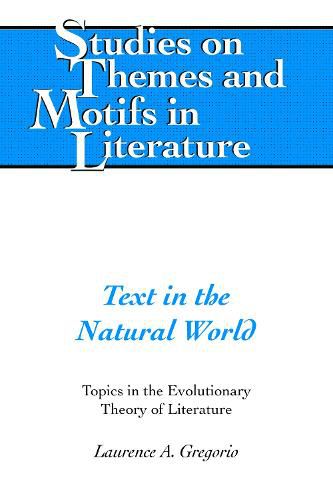Readings Newsletter
Become a Readings Member to make your shopping experience even easier.
Sign in or sign up for free!
You’re not far away from qualifying for FREE standard shipping within Australia
You’ve qualified for FREE standard shipping within Australia
The cart is loading…






This title is printed to order. This book may have been self-published. If so, we cannot guarantee the quality of the content. In the main most books will have gone through the editing process however some may not. We therefore suggest that you be aware of this before ordering this book. If in doubt check either the author or publisher’s details as we are unable to accept any returns unless they are faulty. Please contact us if you have any questions.
The study of literature has expanded to include an evolutionary perspective. Its premise is that the literary text and literature as an overarching institution came into existence as a product of the same evolutionary process that gave rise to the human species. In this view, literature is an evolutionary adaptation that functions as any other adaptation does, as a means of enhancing survivability and also promoting benefits for the individual and society. Text in the Natural World is an introduction to the theory and a survey of topics pertinent to the evolutionary view of literature. After a polemical, prefatory chapter and an overview of the pertinent aspects of evolutionary theory itself, the book examines integral building blocks of literature and literary expression as effects of evolutionary development. This includes chapters on moral sense, symbolic thought, literary aesthetics in general, literary ontology, the broad topic of form, function and device in literature, a last theoretical chapter on narrative, and a chapter on literary themes. The concluding chapter builds on the preceding one as an illustration of evolutionary thematic study in practice, in a study of the fauna in the fiction of Maupassant. This text is designed to be of interest to those who read and think about things literary, as well as to those who have interest in the extension of Darwin’s great idea across the horizon of human culture. It tries to bridge the gulf that has separated the humanities from the sciences, and would be a helpful text for courses taught in both literary theory and interdisciplinary approaches to literature and philosophy.
$9.00 standard shipping within Australia
FREE standard shipping within Australia for orders over $100.00
Express & International shipping calculated at checkout
This title is printed to order. This book may have been self-published. If so, we cannot guarantee the quality of the content. In the main most books will have gone through the editing process however some may not. We therefore suggest that you be aware of this before ordering this book. If in doubt check either the author or publisher’s details as we are unable to accept any returns unless they are faulty. Please contact us if you have any questions.
The study of literature has expanded to include an evolutionary perspective. Its premise is that the literary text and literature as an overarching institution came into existence as a product of the same evolutionary process that gave rise to the human species. In this view, literature is an evolutionary adaptation that functions as any other adaptation does, as a means of enhancing survivability and also promoting benefits for the individual and society. Text in the Natural World is an introduction to the theory and a survey of topics pertinent to the evolutionary view of literature. After a polemical, prefatory chapter and an overview of the pertinent aspects of evolutionary theory itself, the book examines integral building blocks of literature and literary expression as effects of evolutionary development. This includes chapters on moral sense, symbolic thought, literary aesthetics in general, literary ontology, the broad topic of form, function and device in literature, a last theoretical chapter on narrative, and a chapter on literary themes. The concluding chapter builds on the preceding one as an illustration of evolutionary thematic study in practice, in a study of the fauna in the fiction of Maupassant. This text is designed to be of interest to those who read and think about things literary, as well as to those who have interest in the extension of Darwin’s great idea across the horizon of human culture. It tries to bridge the gulf that has separated the humanities from the sciences, and would be a helpful text for courses taught in both literary theory and interdisciplinary approaches to literature and philosophy.